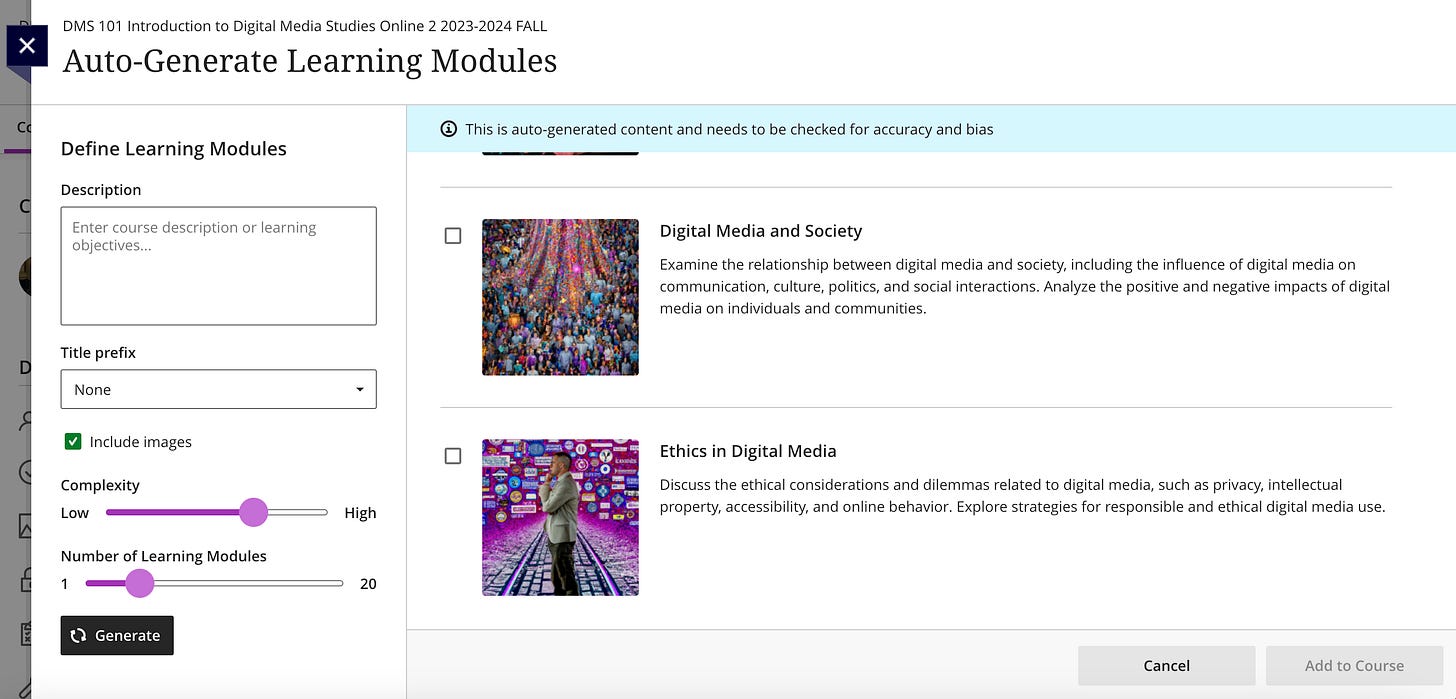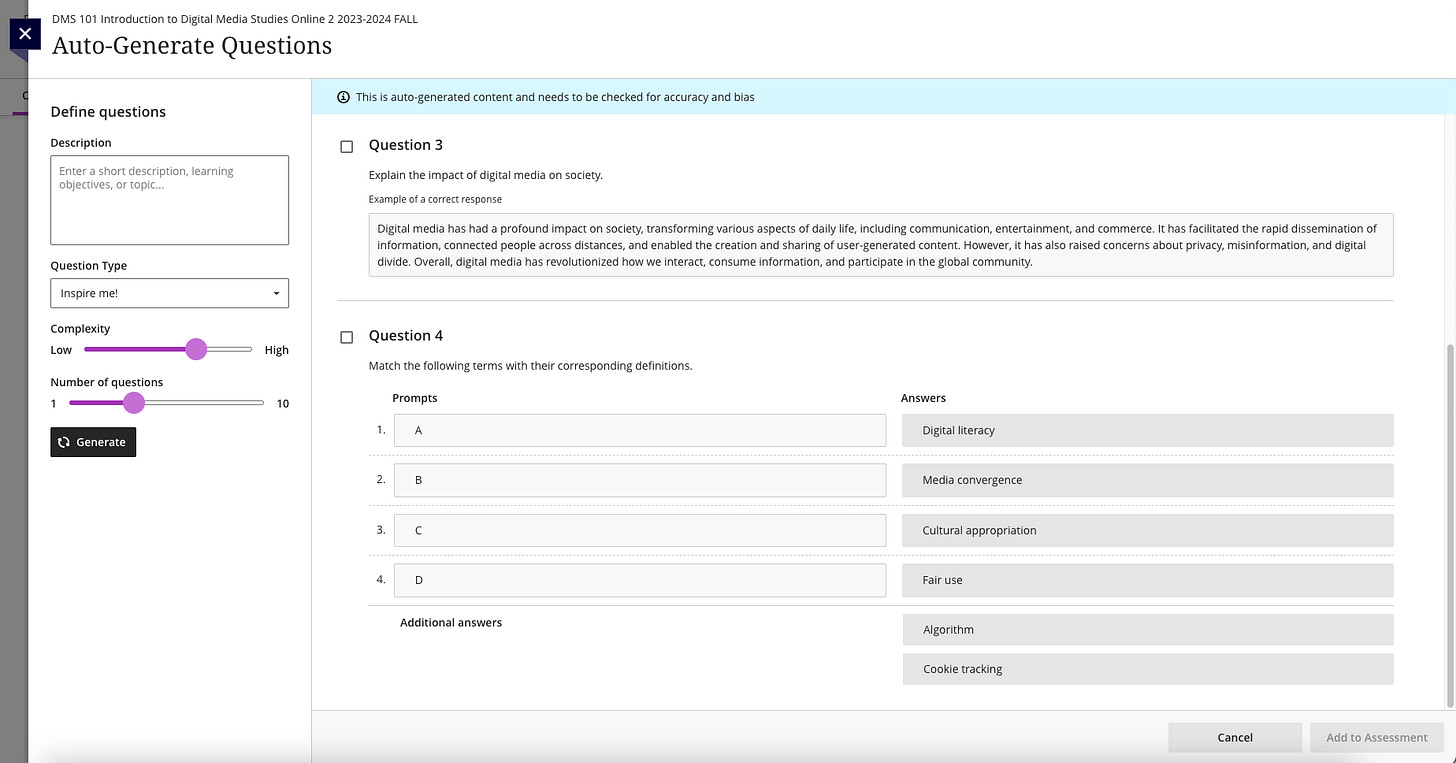Automation Arrives in the Classroom
Blackboard's AI assistant generates lessons and quizzes. What does this mean for labor?
We’ve hit an inflection point in education—my university just activated Blackboard Ultra’s AI assistant in our LMS software. At first glance, it seems helpful - it can instantly generate learning modules, quizzes, rubrics and more based on my existing course content. But when I asked it to make a module for my Digital Media Studies class, some of the results felt...off. The auto-generated quiz questions feel generic. The student images it created were downright weird. And most importantly - it wasn’t my voice or thoughts behind the material. If I let an algorithm design my curriculum and assessments, what does that say about me as a teacher? More pointedly, what does it say to administration about my labor? Let’s take a tour of its current features:
Generating Learning Modules
There’s a simple text-based interface to generate basic learning pathways, but I didn’t even need to use it for the examples below—the system simply scanned my existing Digital Media Studies course and came up with modules as a response. Most of the generated features come with some small warning about hallucinations and bias.
Auto Generate Questions
Like generating modules, I can also generate quiz questions for my students. Again, the system simply scanned what I had within the course and created questions based off of the existing content. I can then tweak the questions as needed.
Rubrics
The AI assistant also generated number and percentage rubrics for assignments and tests. These were pretty generic, but the implications are anything but. If I create an assignment, and then ask AI to develop an assessment, am I following my own critical judgment as an educator or that of an algorithm?
Generating Images
It looks like the AI Assistant is using a less capable image generation model. The few images I generated were grotesque caricatures of what it thought college students looked like. I will note there is some attention to diversity in the generated images, but I’m not sure it matters seeing what race you are when a machine generates a fourteen-fingered representation of what it thinks diversity in a college classroom should look like.
We Need a Critical Approach to AI In Instructional Design
We’ve seen chaos in our classrooms with the uncritical adoption of generative AI technology by our students, and we risk seeing similar chaos unfold among educators who haven’t had the time, training, or bandwidth to arm themselves with the needed AI literacy to make informed choices about employing AI as a teaching aid. As with so many other interfaces, the option to generate simply shows up one day within our existing LMS as part of a system update, forcing all of us to contend with generating material each time we create course content.
The pitch is that AI will help overworked professors like me avoid burnout. And sure, having an AI sidekick to help develop materials could be useful. But what are we giving up in the process?
Will auto-generated lessons nurture the same critical thinking skills and student-teacher bonds that we've worked so hard to build? Or will it turn education into a soulless, robotic affair?
How can we expect students not to use AI for their assignments if we're using it to develop learning materials and assessments? The hypocrisy is mind-boggling, no?
Should we embrace generative AI uncritically and let it automate away the human aspects of education? Or approach it thoughtfully, eyes wide open to both its potential and its pitfalls?
Big Tech has deployed these systems far quicker than we thought possible and we didn’t consider how exposed our labor would be once generative AI arrived as updates into existing software. It’s time to redirect the energy away from “will students cheat with generative AI” discourse and open a new chapter— “how much of what I do daily as a teacher is now exposed to automation?”
Up Next: Testing Automation in the Classroom
I’ll be exploring the very question of automation with my Digital Media Studies students by designing a full week of coursework that is entirely AI-generated and the feedback they receive for those assignments will likewise be generated. I’m being transparent with my students about this because I want to see how they feel when an entire week’s worth of learning and teaching is offloaded to a machine.
What’s to Come: Redesigned Professional Development Course
It hasn’t even been three months since I launched my professional development course on Generative AI in Education, but much of the material is already in need of an update. I plan to revise the existing content and streamline the structure. I’m also going to add more lessons on the following:
Anthropic’s Claude 2
OAI’s new plugins for Wikipedia, Canva, and many more
OAI‘s Advanced data analysis
OAI’s Custom Instructions
Bing Enterprise
Google's Duet Suite
Google's NotebookLM
I’ll be developing these new lessons as rolling updates and integrating them into the course when I have time. Time . . . what a wonderful concept that’s in such short supply!








I’m not sure I would trust Canvas to design good prompts for any of this ... so if I can’t customize the prompts, I’m not interested.
The quiz function does seem super useful ... but I don’t give quizzes. 😆
glad I'm not a teacher at this time in history, fascinating to watch it all develop, good luck to you all!